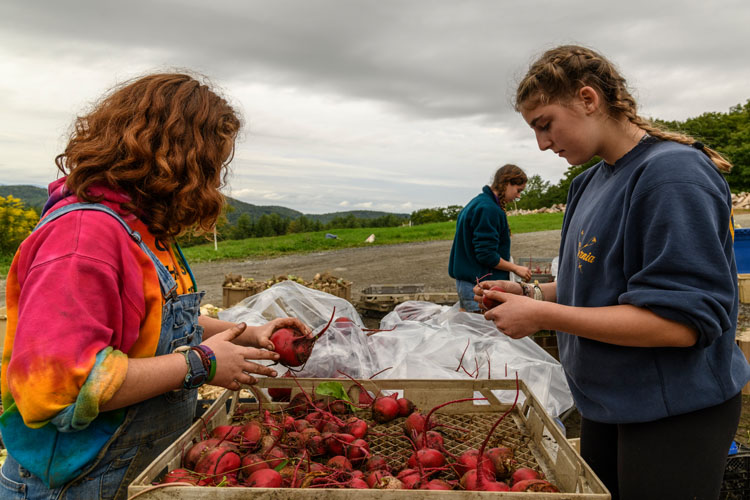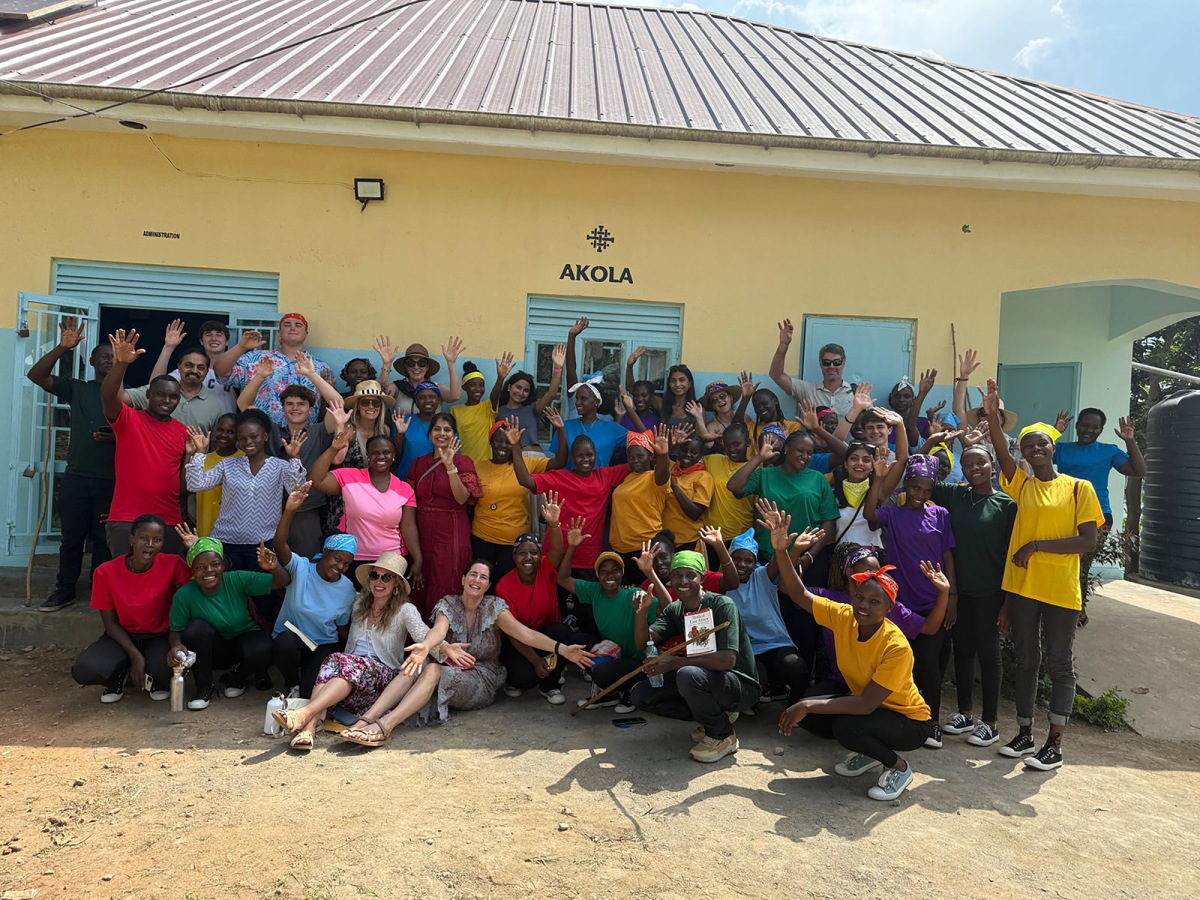//PICTURED ABOVE: Students at The Mountain School Rose (left) and Sadie (right) clean beets at the end of a day spent at the school’s farm. During a farm day, students solely work on the farms all day to harvest vegetables before the end of the growing season.
On the snowy afternoon of Feb. 2, very unlike the one in Dallas, junior Louisa Lindsley will begin her semester abroad at The Mountain School in Vershire, Vermont. As she walks about campus, she will hear the cows mooing, chickens bocking and a familiar Hockaday face, Dr. Sarah Traphagen, talking with students.
The Mountain School promotes an unconventional education, where students live with limited technology and work on a farm in addition to their studies. These practices allow students to form close relationships with each other and their teachers.
One of the areas of The Mountain School that facilitates these close bonds is the lack of technology. Students have their cell phones taken away for the first month of their semester. After that, students can choose whether to take back their phones or continue without them. The Mountain School also only offers WiFi in the academic buildings and dining hall, so students have no access to internet in the dorms or in nature. The cell reception is also limited there, so WiFi is needed for the calls, restricting the area in which students can call or text on campus.
Students also become closer with teachers through their work on the farms. Four times a week, students work for two and a half hours on the farm during work periods led by their teachers. Interim Farm Manager Marisa Hebb trains the teachers so that they can be prepared to guide the students in the task for that day.
“That’s maybe the most stressful part of my job because there is no time to do [conduct the training],” Hebb said. “I have to cram it in to the second half of lunch in a very hurried explanation.”
Along with guiding the teachers, Hebb also takes an inventory of their harvest of the year before and the seeds they have in storage to make the seed order, plans the crop rotation to ensure the maximum yield and creates a seeding and transplanting plan for the crops. She is the chief decision maker when it comes to the farm.
“As we go along, there are thousands of decisions to make every day about how to do things and in what order to do things to get them all done,” Hebb said.
The Mountain School’s farm faces the challenge of a short growing season because of its location in Vermont. Hebb has to prioritize all of her duties at the farm and manage them well in order to prevent the loss of a crop or a smaller yield than normal.
Since The Mountain School is a semester school, the fall and spring terms each get to experience different roles in the success of the farm. Fall students begin their year with the harvest. They learn to pick, wash and store fruits and vegetables for later use by the kitchen. As the weather gets colder, students spend one work period a week chopping down trees on campus to supply the giant boiler that heats the school.
In the spring semester, students continue to gather wood for the boiler. They also seed and transplant for the harvest for the following fall, harvest some salad greens and parsnips, a yield much smaller than in the fall, and install irrigation. Spring students in the winter also get to participate in the making of maple syrup, gathering about 4,000 gallons of sap to make 100 gallons of syrup. Due to the large quantity of syrup produced, The Mountain School does not need to outsource any maple syrup.
In fact, the farm generates enough produce and meat to cover 70 percent of the food eaten at The Mountain School. The school has to outsource all of its wheat and dairy but buys it locally to promote a farming community in Vermont. If a crop fails, they can replace it with some produce just 10 minutes down the road. While the school gets lots of firewood from their forest, they still buy about 85 percent of the firewood needed to heat the campus from local loggers.
“We are really thinking about regional sustainability,” said Hebb. “We want to support the farmers that are nearby as much as possible. We’re striving for sustainability not just of our isolated little campus; we actually want to have connections to the community.”
The Mountain School’s farm, sustainability and challenging academics make it an attractive option for any student looking for a semester away program. Lindsley cannot wait to work on the farm in the spring or see Traphagen, her former English teacher.
“I am really excited to see her when I go,” Lindsley said.
Traphagen worked as a Middle and Upper School English teacher from 2014 to 2018. Now, at The Mountain School, she teaches English, man- ages the library, advises students, coordinates standardized testing and is a dorm mom.
“I wear a lot of hats,” Traphagen said.
Traphagen originally chose to leave Hockaday to be closer to her family in the northeast. The Mountain School attracted her because of its innovative approach to education. Not only do teachers get to teach classes, but they also get to work on the farm, live in the dorms with students and develop close relationships with students through advisory roles. Traphagen currently is the dorm mom to 12 boys and advises two students, who meet with her for 30 minutes every week.
Traphagen also awaits the arrival of her former student. She requested to be a part of Lindsley’s semester experience in some form, either as a teacher, an advisor or a dorm parent.
“I cannot wait to see [Lindsley’s] smiling face,” Traphagen said.
Ultimately, Traphagen appreciates the school’s hands-on approach to education and enjoys the many different ways in which she has been able to bond with those in the community.
“I am not just a teacher here,” Traphagen said. “I really feel like I am making strong connections with students outside of the classroom.”
Story by Kate Woodhouse, News Editor
Photo by Doug Austin












